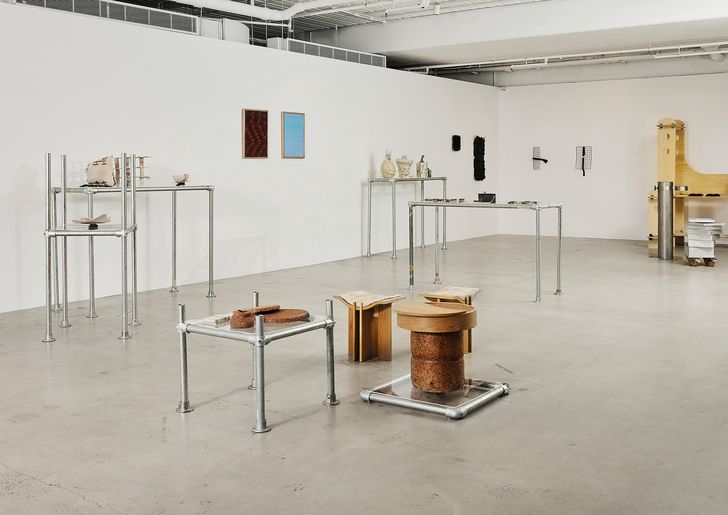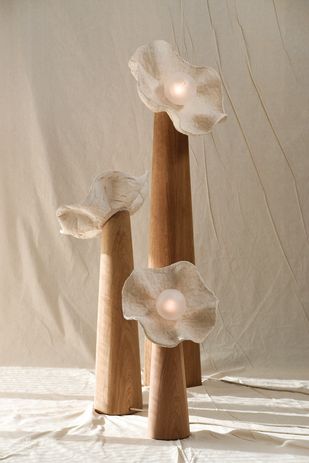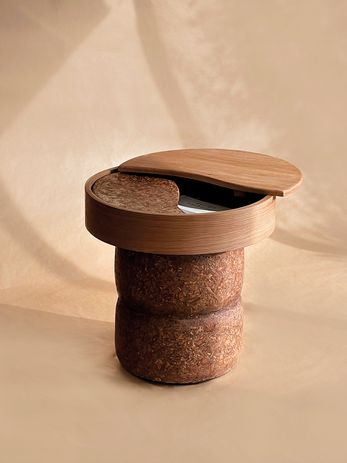[ad_1]
Inside the area of two years, Melbourne-based Joanne Odisho has developed her personal distinctive design language, received a number of graduate awards and established a follow with a transparent imaginative and prescient. In March 2023, Artichoke granted Odisho the Rising Maker prize at Craft’s Recent! Awards, which rejoice the following wave of Victorian craft and design expertise.
Odisho started her design profession by finishing a diploma in inside design at RMIT earlier than happening to review furnishings design. Her resolution to give attention to furnishings quite than interiors was pushed by a want to really feel creatively liberated. “After finishing my research in inside design, I got here to appreciate that I loved the workings of an area as a complete, however turned extra keen on the objects inside them,” Odisho says. That fondness for particular person objects is obvious in her items, which aren’t mere decorations or additions to pre-existing interiors however quite focal factors that set the tone of any area they occupy.

“Furnishings design allowed me to specific my creativity freely, with out the bounds of clientele,” Odisho says.
Like many current graduates of the furnishings design program at RMIT, Odisho is already exhibiting and promoting her items, using social media to share each the method of creating and the ultimate product with an viewers. Odisho acknowledges that she’s embraced a “type of go-with- the-flow perspective,” commonly producing new experimental prototypes.
She pairs this relaxed method with a extra rigorous one on the coronary heart of her follow: a want to focus on the significance of cautious materials choice in an effort to decrease waste. As Odisho explains, “I hope to develop a follow that promotes consciousness about the place our merchandise are coming from and the way we are able to make extra environmentally acutely aware choices in relation to what we put in our personal properties.”
Odisho’s items on the 2023 Recent! exhibition by Craft Victoria. Accompanying works from left to proper by: Richard Monger, Lyras Daear, Jess Dybing, Arthur Nyakuengama and BCDO.
Picture:
Henry Trumble
This pondering is clear within the three collections Odisho has produced, every mixing an natural materials with exact timber parts. These works are a hybrid of the handmade: frames that assist biomaterials akin to paper pulp, eucalyptus bark and different composites created by Odisho herself. The mix of those two components – body and natural materials – permits for the creation of each practical designs and sculptural objects.
“On the subject of practical furnishings, I feel there’ll typically be a side of equipment or automation concerned, notably in our present local weather of mass manufacturing and commodification,” Odisho says. “Implementing a novel or unprecedented materials and exploring your individual bioproduct, nonetheless, lends itself to handmade processing.”
The distinctive lampshades within the Bloom (2022) lighting assortment are handmade from eggshells and pure components.
Picture:
Joanne Odisho
Working example: the Bloom lighting assortment. The timber buildings create peak by way of precision manufacturing, and the lampshades are left to experimental supplies and expression by way of a mix of eggshells and pure components. On the Bloom items, the hand of the maker is seen in that every gentle has a novel look. An identical method has been taken in Odisho’s different two collections, Summit and Foliage, by which timber elements act as structural parts. These timber components enable her to experiment with composite supplies that give character, heat and authenticity to the general designs.
“I intend to retain this handmade ingredient to all of my designs, because it presents a way of authenticity and contributes to the distinctive character of an object,” says Odisho.
Exact timber buildings are mixed with handmade composite supplies to provide items with character.
Picture:
Joanne Odisho
The composite supplies she develops are on the centre of her give attention to sustainable design, pushing the way in which we take into consideration “handmade” with items that discover how totally different discarded supplies will be fashioned into practical biodegradable merchandise. Eggshell paper-pulp re-emerges as lightshades for the Bloom assortment, whereas a compostable materials makes up the seat rests of the Summit stools, each reusing natural matter and enabling individuals to work together with the end result.
“We hardly ever pause to marvel on the supplies that encompass us,” Odisho notes. “We’re by no means with out them, as they’re the foundations on which our complete society is constructed.”
As Odisho continues to discover and create sustainable supplies by way of her follow, maybe her ongoing work will encourage individuals to contemplate whether or not – and the way – supplies is perhaps used to design a greater future.
[ad_2]
Source link






